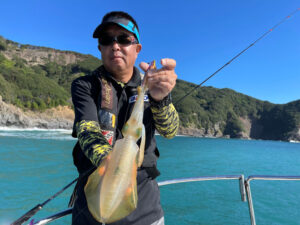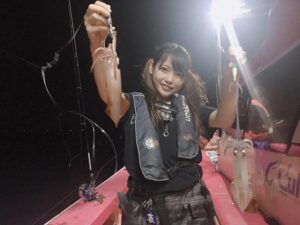“One Fishing Rod” - Children’s Story about Fishing in Japan
Fishing is deep inside the people’s lives in Japan. And it is one of the familiar activities or leisures. Reflecting this situation, there is a lot of literature from various periods in Japanese history.
There is one children’s story about fishermen, written by Mimei Ogawa.
For your small entertainment, I translate one of his stories here.
“One Fishing Rod”
(1)
Once upon a time, there were two fishermen living on the distant coast. Both of them were so poor that living in the city, wearing beautiful kimonos, eating a lot of delicious food, and having luxuries was unimaginable.
These two had wished to have a better life somehow, but they had nothing to do for it. They were only staring at the blue surface of the sea, and always imagining about someday they would have such happiness.
“It is no use imagining it. All we can do is just keep working.”
B told it to A, just as he was trying to cheer himself up.
“I know. But we cannot even work more than we do, now.”
A replied, sighing.
Everyday, they were going fishing or netting, sailing out into the offshore, even when it was rainy or windy to make the waves high.
They helped each other with anything. And they were working together for most of the time. But the fate of humans is very mysterious. Even though they were riding the same boat and working in the same way, one could receive the luck and the others could not get anything at all.
(2)
On one spring day, it was the time for the cherry blossoms on the ground. They were out on the blue sea in the north fishing. It was a good season for the red seabream. It was the fish they could not eat even when they could get one. They had to sell it to a fish store in the city, to get money to sustain their families.
“It is boring that we cannot eat the red seabream which we catch everyday. I will cook it and let our children eat it, today.” said A.
“You are right. After I get home, I will cook it and give it to my wife and children.” said B.
On that day, they went back home after their work in the sea. And both of them cooked one piece of seabream, at home. Then, A found out that his fish had a pearl the size of the nail of pinky finger.
“It is really a surprise.” A sprang up with joy, and all of his family were partying.
A went to B right after it. He went there to ask whether B had found any pearl in the fish or not. B said this, happily.
“It is a rare thing. Probably, we will never find another pearl, even when we open every red seabream in the world. This was given to you by the god.”
A went back home, being happier.
(3)
Because of it, A got a lot of money, and he had a few days off from the sea from the following day. He said he needed to take a good rest in such a chance.
B went out to the sea alone. He did so on rainy days and windy days. Looking at this, A did not feel good. He felt bad for B that only he was going an easy way.
“B, I can give you some money, though the amount cannot be large.” said A, one day, to B.
B took a while to think.
“Then, though it causes you a little trouble, please lend me some money to buy a fishing rod. I cannot fish in the way I wish with the current rod, and I want to have a better one.” replied B.
A thought that a good rod cannot make any difference in the result of fishing. When you can catch, you can get good results. When you cannot, you cannot do anything. Even with a better rod, it would not work. Everything about humans were on luck, just like what had happened to him.
“It is no problem to do so.” said A and lent some money to B. He bought a fishing rod for that money.
(4)
After A got that money, he could not help doing something he had never done before. He bought new better quality nets. All of his family bought better kimonos. And they went sightseeing in the city.
“If I spend all my money, I can start working again.” said A.
Soon, the money he got from the pearl had gone. A resumed work on the sea with B. But A could not do it as before. He could not fish calmly, and could not cast nets well. Once he got the fish, he opened the belly of each fish. When he found no pearl in it, he threw the dead fish into the sea.
“Why do you do such cruel things, A?” said B being surprised.
“If I found another pearl, I would go to the city and start a new business. I don’t care about fishing anymore.” said A. And he casted his net everywhere around. But there was no fish with a piece of pearl in its belly.
There came the day that A found himself how foolish he was. He became poorer, as he had come back to his life fishing calmly to sell his fish in the city. Then, one day, his high quality net had a hole in it. It was the day he found his foolishness.
B continued fishing with the rod, taking good care of it. And he appreciated the help of A for a long time and he would be helping A if he would need it. B thought about how significant having that fishing rod was.
The End
About the author
Mimei Ogawa was born in 1882 and died in 1961. He is famous for his works in the category of short stories, children’s stories and fairy tales.
This story was published in 1921, as an article in a newspaper.
Image of Mimei Ogawa, by Isamu Terao, from Wikipedia CC.
His works reflect everyday matters, often to tell lessons to readers.
In this story, using the very familiar themes, such as fish and fishing, he was trying to show the importance of helping others, not being selfish nor arrogant. It told the value that lives of creatures should not be wasted, also.
For those who are interested, you can view it from this link. (Japanese text)

